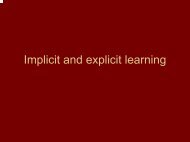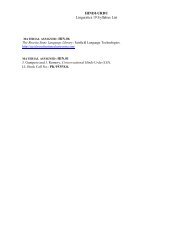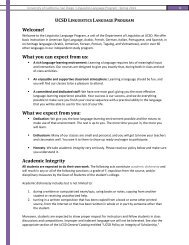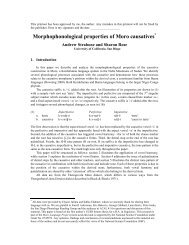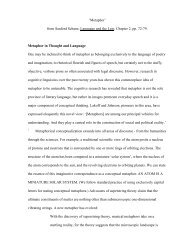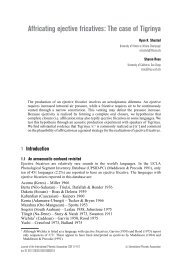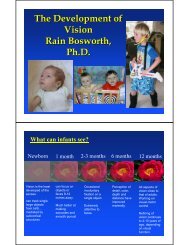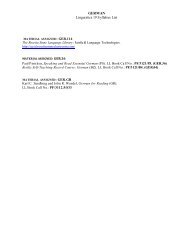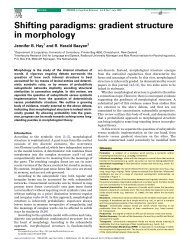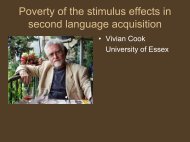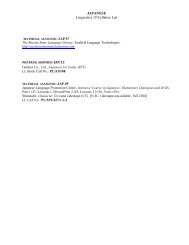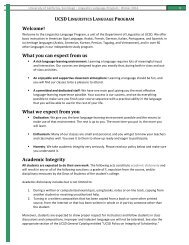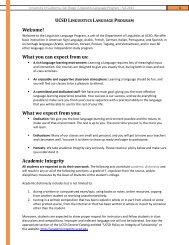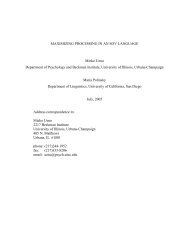Paradigms and Periphrastic Expression - Linguistics - UC San Diego
Paradigms and Periphrastic Expression - Linguistics - UC San Diego
Paradigms and Periphrastic Expression - Linguistics - UC San Diego
You also want an ePaper? Increase the reach of your titles
YUMPU automatically turns print PDFs into web optimized ePapers that Google loves.
16. Constructional effect:<br />
• The present tense form cannot bear the feature [TNS:present], since the whole<br />
construction is past.<br />
À A verbal lexeme L with feature values [POL:aff], [TNS: cont. past], [PERS: ],<br />
[NUM: ] has periphrastic exponence.<br />
À A verbal lexeme L with feature values [POL:neg], [TNS: cont. past], [PERS: ], [NUM: ] has periphrastic exponence<br />
17. Imperfective past: combination of form from future tense paradigm <strong>and</strong> invariant past form of<br />
copula. 11<br />
F. [POL:aff], [TNS: imp. past]: [POL:neg], [TNS: imp. past]:<br />
SG.1. mVno val SG.1. ug mVnV val<br />
2. mVnod val 2. ud mVnV val<br />
3. mVnoz val ‘s/he used to 3. uz mVnV val ‘s/he didn’t used to<br />
go (long time ago)’ go (long time ago)’<br />
PL.1 mVnom(V) val PL.1 um mVne(le) val<br />
2. mVnodV val 2. ud mVne(le) val<br />
3. mVnozV val 3. uz mVne(le) val<br />
18. Paradigm effect:<br />
• The full set of forms from future tense paradigm is used in the imperfective past tense<br />
paradigm for the indication of person/number.<br />
19. Constructional effect:<br />
• The future tense form cannot bear the feature [TNS:future], since the whole construction<br />
is past.<br />
• Neither of the forms in the construction are associated with a habitual sense or ‘long ago’,<br />
independent of this construction.<br />
• Neither of the forms in the continuitive past (=14) are associated with `recent past’<br />
relative to distant past associated with imperfective past.<br />
11 The semantics of this tense too requires further investigation: Suihkonen 1995:302 designates it as<br />
"iterative". The difference between the continuitive past (= 14) <strong>and</strong> the imperfective past (=17) appears to<br />
be the relative time in the past when a protracted or repeated event occurred, specifically, relatively<br />
recently (<strong>and</strong> not necessarily repeated) with the continuative <strong>and</strong> a long time ago with the imperfective. If<br />
something like this is correct, then the relative times would have to be keyed to the inflecting verbs, since<br />
the copulas are invariant in both constructions. This suggests that both present <strong>and</strong> future might be best<br />
interpreted as indicating reference points relative to an established time: when the default is the so-called<br />
"present" there is no overt marker <strong>and</strong> the present form indicates greater closeness to the present than the<br />
"future". When a past time is established by the presence of the copula, then the "present" form indicates<br />
greater closeness to a time in the past, while the "future" indicates greater distance from that time. This<br />
speculative hypothesis needs further examination.<br />
8



